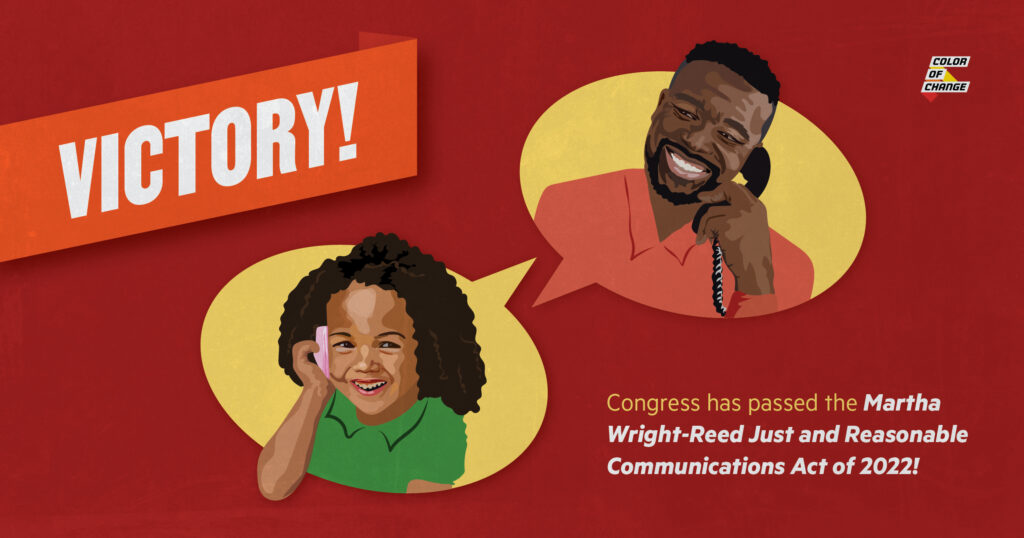COC Member Pressure Results in New Law Lowering Cost to Stay in Touch with Jailed Loved Ones

By Liz Courquet Lesaunier
Back when he was in prison, Reginald Belle knew that if he wanted to phone home, the telecom corporation that connected him to the outside world would charge as much as $1 a minute for the call. At that crazy-high rate, his loved ones told him, their monthly bill sometimes skyrocketed to $1,000.
So to save money, Belle recalled, he “would go to the phone with a stopwatch.”
That’s why Belle said he was elated when President Joe Biden signed a bill on Jan. 5 intended to eliminate predatory rates for phone calls from prison.
“My initial reaction was just happiness for so many people that I know who are still incarcerated, that still struggle with being able to call home,” said Belle, now a campaigns and programs fellow at The Leadership Conference on Civil and Human Rights in Washington, D.C. “Oftentimes, families are unaware of the cost of these calls until they actually get the phone bill.”
The legislation Biden signed into law allows the Federal Communications Commission to regulate the rates of prison and jail phone and video calls. It also marks a significant win for Color Of Change, which backed the bill and, with the help of its 7 million members, pressured Congress to pass it.
Named for a woman who had to pay outrageous sums for brief chats with her grandson, the Martha Wright-Reed Just and Reasonable Communications Act of 2022 strikes a significant blow to the prison telecommunications industry, which rakes in $1.4 billion a year. But it was a long time coming.
Some 20 years ago, Wright had been receiving phone bills totaling hundreds of dollars a month for accepting collect calls — 15-minute chats once or twice a week — from Ulandis Forte, her incarcerated grandson. Alarmed at how much money the chats cost his grandmother, Forte made the agonizing decision to stop calling her.
But Wright – who lost her sight and was unable to write letters to her grandson – fought back.
In 2003, the retired nurse petitioned the FCC for help, then joined forces with other prison phone justice advocates, taking on what’s widely described as a predatory industry.
How predatory?
A 2021 analysis by The Prison Policy Initiative puts the average cost of a 15-minute phone call at roughly $3. But Erick Fernandez, a campaign manager on Color of Change’s Policy and Government Affairs Team, says prison telecom corporations like Securus and ViaPath Technologies can charge families as much as $15 for a 15- minute phone call.
“These aren’t rates that we would accept, personally, for our phone calls,” Fernandez said.
Besides putting the squeeze on families of the incarcerated – many of whom are low-income and struggling to put food on the table – both Fernandez and Belle said price-gouging corporations are harming more than just a household’s budget.
Studies show phone calls home help reduce the recidivism rate, Fernandez says; incarcerated people who lose contact with loved ones are more likely to reoffend after release and end up back in prison. Meanwhile, behind bars, Belle said the phone-call cost barrier often triggered bouts of depression in himself and others.
Some would “stop taking showers, stop bathing, stop combing their hair,” Belle said. “I’ve even seen people attempt to take their lives. And a few of them succeeded.”
Forte, Martha Wright’s grandson, understands the logic: “The longer you’ve been in prison, the more distant you become to the outside world,” he told The Verge in December. “People can’t afford you any more.”
Although the legislation is now federal law – and lawmakers in both California and Connecticut recently made calls from jails and prisons free – there’s still work to be done on the state level, Fernandez said.
Fernandez recommends people mobilize and “call their state representatives to ask them to make phone calls free.”
In addition, Fernandez says families might not see an immediate change in the cost of connecting with their loved ones. That’s because there’s an 18- to 24-month period for the FCC to evaluate the new law.
Still, the prison phone justice act also could significantly improve the mental health of an incarcerated person’s loved ones, too, according to Denise Wilson, a longtime Color Of Change member and volunteer.
“I think it will be better for the children because it’s family reunification,” said Wilson, 38. Her father, David Wayne Wilson, has been incarcerated since she was 12.
“As a child, I would have loved to speak with my dad more often,” Wilson said. Instead, she would get in trouble if he called collect, she answered the phone and accepted the charges.
Back then, the adults told her that “I’m not able to pay for the bill because I’m a minor, and a minor can’t afford $300 a month for phone calls,” Wilson said. But in retrospect, she said, the time she could have spent talking to her dad would have been far more precious.
“I can’t get none of that time back,” Wilson said.

